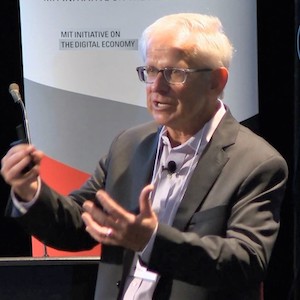 Platform businesses scale differently than traditional businesses. Platforms scale through network effects. In the previous post, we introduced and described a widely used metaphor: pipes vs. platforms. Traditional businesses are pipes. Their value chains are linear. Value is added at sequential stages before a final product or service is delivered to consumers at the end of the pipeline. Platforms do not produce goods or services themselves—they make connections among stakeholders and facilitate value exchange among those stakeholders. Value is created outside the platform. Both pipeline businesses and platform businesses strive to achieve scale—but the type of scale they strive for is vastly different. In this post, we’ll explain how pipeline businesses strive for economies of scale (on the supply side) and how platform businesses scale through network effects (on the demand side).
Platform businesses scale differently than traditional businesses. Platforms scale through network effects. In the previous post, we introduced and described a widely used metaphor: pipes vs. platforms. Traditional businesses are pipes. Their value chains are linear. Value is added at sequential stages before a final product or service is delivered to consumers at the end of the pipeline. Platforms do not produce goods or services themselves—they make connections among stakeholders and facilitate value exchange among those stakeholders. Value is created outside the platform. Both pipeline businesses and platform businesses strive to achieve scale—but the type of scale they strive for is vastly different. In this post, we’ll explain how pipeline businesses strive for economies of scale (on the supply side) and how platform businesses scale through network effects (on the demand side).
News
A Data Scientist's Guide To Open Source Community Analysis
 In the golden age of data analysis, open source communities are not exempt from the frenzy around getting some big, fancy numbers onto presentation slides. Such information can bring even more value if you master the art of generating a well-analyzed question with proper execution. You might expect me, a data scientist, to tell you that data analysis and automation will inform your community decisions. It's actually the opposite. Use data analysis to build on your existing open source community knowledge, incorporate others, and uncover potential biases and perspectives not considered. You might be an expert at implementing community events, while your colleague is a wiz at all things code. As each of you develops visualizations within the context of your own knowledge, you both can benefit from that information.
In the golden age of data analysis, open source communities are not exempt from the frenzy around getting some big, fancy numbers onto presentation slides. Such information can bring even more value if you master the art of generating a well-analyzed question with proper execution. You might expect me, a data scientist, to tell you that data analysis and automation will inform your community decisions. It's actually the opposite. Use data analysis to build on your existing open source community knowledge, incorporate others, and uncover potential biases and perspectives not considered. You might be an expert at implementing community events, while your colleague is a wiz at all things code. As each of you develops visualizations within the context of your own knowledge, you both can benefit from that information.
- Login to post comments
- News
A New Generation Of Tools For Open Source Vulnerability Management
 Product security incident response teams (PSIRTs) are teams of security professionals that work diligently behind the scenes to protect software products and services of companies. A PSIRT is a different breed than a computer security incident response team (CSIRT), those that tend to be called Information Security. The difference is simple but stark: a CSIRT focuses on responding to incidents that affect a company's infrastructure, data or users. A PSIRT focuses on responding to incidents that affect products a company builds, the most common being the discovery of a vulnerability or security defect, and subsequent actions to manage or remediate. Read More »
Product security incident response teams (PSIRTs) are teams of security professionals that work diligently behind the scenes to protect software products and services of companies. A PSIRT is a different breed than a computer security incident response team (CSIRT), those that tend to be called Information Security. The difference is simple but stark: a CSIRT focuses on responding to incidents that affect a company's infrastructure, data or users. A PSIRT focuses on responding to incidents that affect products a company builds, the most common being the discovery of a vulnerability or security defect, and subsequent actions to manage or remediate. Read More »
- Login to post comments
- News
The New Rules of Healthcare Platforms (Part 2): Pipe Scale vs. Platform Scale
- Login to post comments
- News
ONC HITAC Public Health Data Systems Task Force Releases Recommendations
 On November 10, 2022 the Office of the National Coordinator for Health Information Technology’s (ONC) Health Information Technology Advisory Committee (HITAC) accepted and approved the recommendations of its ad hoc Public Health Data Systems Task Force. As discussed in an earlier post, the Task Force has been meeting since August 2022 and was charged with examining how improvements might be made in ONC certification rules for criteria related to public health data submission. In addition, and perhaps for the first time, the task force was also charged with developing recommendations related to the public health side of the equation: how public health data systems and/or standards might improve to ensure a smoother flow of information with clinical care. Read More »
On November 10, 2022 the Office of the National Coordinator for Health Information Technology’s (ONC) Health Information Technology Advisory Committee (HITAC) accepted and approved the recommendations of its ad hoc Public Health Data Systems Task Force. As discussed in an earlier post, the Task Force has been meeting since August 2022 and was charged with examining how improvements might be made in ONC certification rules for criteria related to public health data submission. In addition, and perhaps for the first time, the task force was also charged with developing recommendations related to the public health side of the equation: how public health data systems and/or standards might improve to ensure a smoother flow of information with clinical care. Read More »
- Login to post comments
- News
How Open Source Powers Innovation
 Where do people come together to make cutting-edge invention and innovation happen?....What of open source software? Certainly, major projects are highly collaborative. Open source software also supports the kind of knowledge diffusion that, throughout history, has enabled the spread of at least incremental advances in everything from viticulture to blast furnace design in 19th-century England. That said, open source software, historically, had a reputation primarily for being good enough and cheaper than proprietary software. That's changed significantly, especially in areas like working with large volumes of data and the whole cloud-native ecosystem. This development probably represents how collaboration has trumped a tendency towards incrementalism in many cases. IP concerns are primarily handled in open source software—occasional patent and license incompatibility issues notwithstanding.
Where do people come together to make cutting-edge invention and innovation happen?....What of open source software? Certainly, major projects are highly collaborative. Open source software also supports the kind of knowledge diffusion that, throughout history, has enabled the spread of at least incremental advances in everything from viticulture to blast furnace design in 19th-century England. That said, open source software, historically, had a reputation primarily for being good enough and cheaper than proprietary software. That's changed significantly, especially in areas like working with large volumes of data and the whole cloud-native ecosystem. This development probably represents how collaboration has trumped a tendency towards incrementalism in many cases. IP concerns are primarily handled in open source software—occasional patent and license incompatibility issues notwithstanding.
- Login to post comments
- News
The New Rules of Healthcare Platforms (Part 1): Value Creation Shifts from Pipes to Platforms
 Value for customers is created differently on platforms than by traditional product/service business models. Today we’ll present and discuss the metaphor of how traditional businesses can be thought of as “pipelines” and how these pipes differ from digital platforms. This post is the first in a new series: “The New Rules of Healthcare Platforms.” We’ll be writing about platform thinking, new mental models, and the new economics of platform business models and strategy. We’ll have at least seven posts to explain these new rules. You’ll have some unlearning to do. We’ll illustrate how platform business models are fundamentally different than traditional product/service business models. To understand platforms, we need to change more than just our thinking—we need to learn new rules about how the digital world works and how platforms fit in.
Value for customers is created differently on platforms than by traditional product/service business models. Today we’ll present and discuss the metaphor of how traditional businesses can be thought of as “pipelines” and how these pipes differ from digital platforms. This post is the first in a new series: “The New Rules of Healthcare Platforms.” We’ll be writing about platform thinking, new mental models, and the new economics of platform business models and strategy. We’ll have at least seven posts to explain these new rules. You’ll have some unlearning to do. We’ll illustrate how platform business models are fundamentally different than traditional product/service business models. To understand platforms, we need to change more than just our thinking—we need to learn new rules about how the digital world works and how platforms fit in.
- Login to post comments
- News
Draft TEFCA Facilitated FHIR Implementation Guide: A Public Health Perspective
 On October 7, 2022, the Trusted Exchange Framework and Common Agreement (TEFCA) project released a Draft TEFCA Facilitated FHIR Implementation Guide. As described in an earlier post, the project released a specific plan for integrating HL7 Fast Health Information Resources (FHIR) into the architecture that was defined explicitly in a new Roadmap for later implementation. This draft implementation guide (IG) provides the initial proposed details for this functionality. TEFCA only poses technical requirements on its direct participants, the Qualified Health Information Networks, or QHINs, but they are not the actual sources nor destinations of the data. The actual “FHIR details” are sketchy in this IG; maybe that is by design. It seems to specify just what the QHIN needs to know to do patient discovery and move the query and response around rather than any specifics on where a query originates nor where the response goes, let alone what data is contained.
On October 7, 2022, the Trusted Exchange Framework and Common Agreement (TEFCA) project released a Draft TEFCA Facilitated FHIR Implementation Guide. As described in an earlier post, the project released a specific plan for integrating HL7 Fast Health Information Resources (FHIR) into the architecture that was defined explicitly in a new Roadmap for later implementation. This draft implementation guide (IG) provides the initial proposed details for this functionality. TEFCA only poses technical requirements on its direct participants, the Qualified Health Information Networks, or QHINs, but they are not the actual sources nor destinations of the data. The actual “FHIR details” are sketchy in this IG; maybe that is by design. It seems to specify just what the QHIN needs to know to do patient discovery and move the query and response around rather than any specifics on where a query originates nor where the response goes, let alone what data is contained.
- Login to post comments
- News
The Missing Ingredient in Today's Patient Portals: Network Effects (Part 4)
 As described in the first three posts in this series, today’s patient portals are inherently flawed and doomed to mediocrity. The result is that today’s patient portals cannot achieve a critical mass of adoption and utilization, and therefore portals can’t achieve network effects. In this post, we will: Summarize key points from the first three posts in this series; Explain how today’s patient portals miss out on three types of network effects; Explain the implications: why tomorrow’s portals must be reconfigured to achieve network effects
As described in the first three posts in this series, today’s patient portals are inherently flawed and doomed to mediocrity. The result is that today’s patient portals cannot achieve a critical mass of adoption and utilization, and therefore portals can’t achieve network effects. In this post, we will: Summarize key points from the first three posts in this series; Explain how today’s patient portals miss out on three types of network effects; Explain the implications: why tomorrow’s portals must be reconfigured to achieve network effects
- Login to post comments
- News
2022 HL7 Working Group Meeting Continues to Advance a Public Health Agenda
 The HLN Consulting team attended the HL7 36th Annual Plenary & Working Group Meeting (WGM) held in Baltimore, MD, September 17 – 23, 2022. More than 500 attendees, representing all aspects of the industry, were a part of the WGM in-person meeting after 2 years of virtual meetings. The seven day event started on Saturday with a weekend connectathon. This meeting offered an opportunity for attendees to come together and collaborate. It was a valuable meeting especially for people involved in standards development around healthcare. Read More »
The HLN Consulting team attended the HL7 36th Annual Plenary & Working Group Meeting (WGM) held in Baltimore, MD, September 17 – 23, 2022. More than 500 attendees, representing all aspects of the industry, were a part of the WGM in-person meeting after 2 years of virtual meetings. The seven day event started on Saturday with a weekend connectathon. This meeting offered an opportunity for attendees to come together and collaborate. It was a valuable meeting especially for people involved in standards development around healthcare. Read More »
- Login to post comments
- News
Build An Open Source Project Using This Essential Advice
 Open source is a flourishing and beneficial ecosystem that publicly solves problems in communities and industries using software developed through a decentralized model and community contributions. Over the years, this ecosystem has grown in number and strength among hobbyists and professionals alike. It's mainstream now—even proprietary companies use open source to build software. With the ecosystem booming, many developers want to get in and build new open source projects. The question is: How do you achieve that successfully? This article will demystify the lifecycle and structure of open source projects. I want to give you an overview of what goes on inside an open source project and show you how to build a successful and sustainable project based on my personal experience.
Open source is a flourishing and beneficial ecosystem that publicly solves problems in communities and industries using software developed through a decentralized model and community contributions. Over the years, this ecosystem has grown in number and strength among hobbyists and professionals alike. It's mainstream now—even proprietary companies use open source to build software. With the ecosystem booming, many developers want to get in and build new open source projects. The question is: How do you achieve that successfully? This article will demystify the lifecycle and structure of open source projects. I want to give you an overview of what goes on inside an open source project and show you how to build a successful and sustainable project based on my personal experience.
- Login to post comments
- News